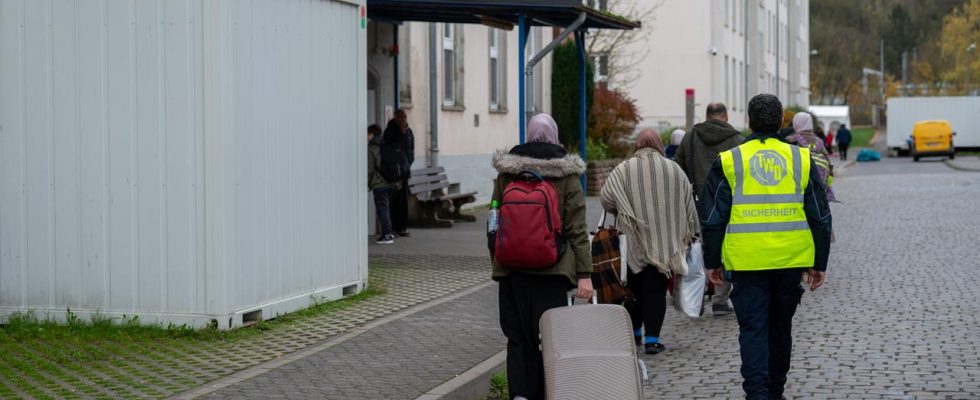The federal and state governments are once again discussing refugee policy. A CSU proposal has met with a positive response across parties: According to this, new Ukraine refugees should no longer receive citizens’ benefit, but instead should receive assistance in accordance with the Asylum Seekers’ Benefits Act.
Under the pressure of persistently high numbers of asylum seekers, the heads of government of the federal states met in Berlin to discuss migration policy. A proposal from the Bavarian Interior Minister Joachim Herrmann (CSU) could possibly also be on the table. In the Germany editorial network, Herrmann suggested that newly arriving refugees from Ukraine should no longer be paid citizens’ benefit, but instead should be given assistance in accordance with the Asylum Seekers’ Benefits Act. Social incentives to come to Germany should be significantly reduced.
For comparison: a single asylum seeker is entitled to a maximum of 460 euros per month according to the Asylum Seekers Benefits Act. The rate for a single adult is 563 euros per month.
Rehlinger: “More worthy of discussion Suggestion”
Saarland Prime Minister Anke Rehlinger (SPD) called the initiative from Bavaria “a proposal for the future worth discussing.” Rehlinger said that at the beginning of Russia’s attack on Ukraine it made sense to include Ukrainian refugees in the citizen’s allowance. This also had administrative reasons – for example with regard to the question of which authorities in Germany should be responsible for the refugees. The situation is now different, which is why the proposal from Bavaria can be discussed. “I am at least open to such considerations in the future,” said Rehlinger.
The FDP also supports Herrmann’s proposal
The FDP also supported the proposal to reduce benefits for future Ukraine refugees. The parliamentary managing director of the FDP parliamentary group, Stefan Thomae, said in the “Augsburger Allgemeine” that the idea of immediately integrating people from Ukraine into the citizen’s benefit system did not come from the federal government at the time, but from the districts. “It is now recognized that the low employment rate of Ukrainian refugees in Germany compared to other host countries could not only have to do with language barriers and childcare issues, but also with the small wage gap between citizen’s benefit and housing costs covered and low employment income.”
Union puts pressure before consultations
In the afternoon, Chancellor Olaf Scholz (SPD) also wants to take part in the deliberations. Before the meeting, Union politicians in particular called for faster and more consistent implementation of the November decisions aimed at limiting irregular migration. “We will not be able to get the issue of irregular migration in Germany under control this year,” said Bavaria’s Prime Minister Markus Söder (CSU). In the end, this will not only lead to a huge overtaxing of the municipalities, “but it will also lead to tension in the democratic stability and cohesion of the country.” The Prime Ministers of North Rhine-Westphalia and Saxony, Hendrik Wüst and Michael Kretschmer (both CDU), also described the measures taken by the traffic light government as insufficient.
The federal and state governments had already agreed on November 6th on a series of reforms to reduce irregular migration, the implementation of which is now to be reviewed. This includes, for example, the expansion of the number of countries classified as safe countries of origin, agreements with third countries for the return of rejected asylum seekers or the introduction of a payment card in order to provide asylum seekers with more benefits in kind instead of money.
Municipalities on the load limit
The Association of Cities and Municipalities reiterated its demand for relief. “The municipalities are at their limits when it comes to accommodation, care and integration,” said managing director André Berghegger to the “Augsburger Allgemeine”. He called for the federal and state governments to contribute more to the costs of accommodation and integration. The President of the District Council, Reinhard Sager (CDU), insisted on expanding the list of safe countries of origin. “We need greater progress in migration policy – this particularly applies to the repatriation offensive announced by the federal government,” he told the “Rheinische Post”. “In addition to intensive work on the necessary return agreements, we also need a further, more significant expansion of the list of safe countries of origin.”
Dreyer doesn’t see any additional ones Need for action
The head of the Rhineland-Palatinate government, Malu Dreyer (SPD), sees no reason for further tightening of asylum policy. “The number of refugees is falling, this is certainly also due to the winter effect, but it also shows that the measures are working,” she told the newspapers of the Funke media group. “At the most recent Prime Minister’s Conference in November, we made extensive regulations to limit irregular migration, achieve a fairer distribution in Europe and thus relieve Germany.” A lot has already been implemented.

